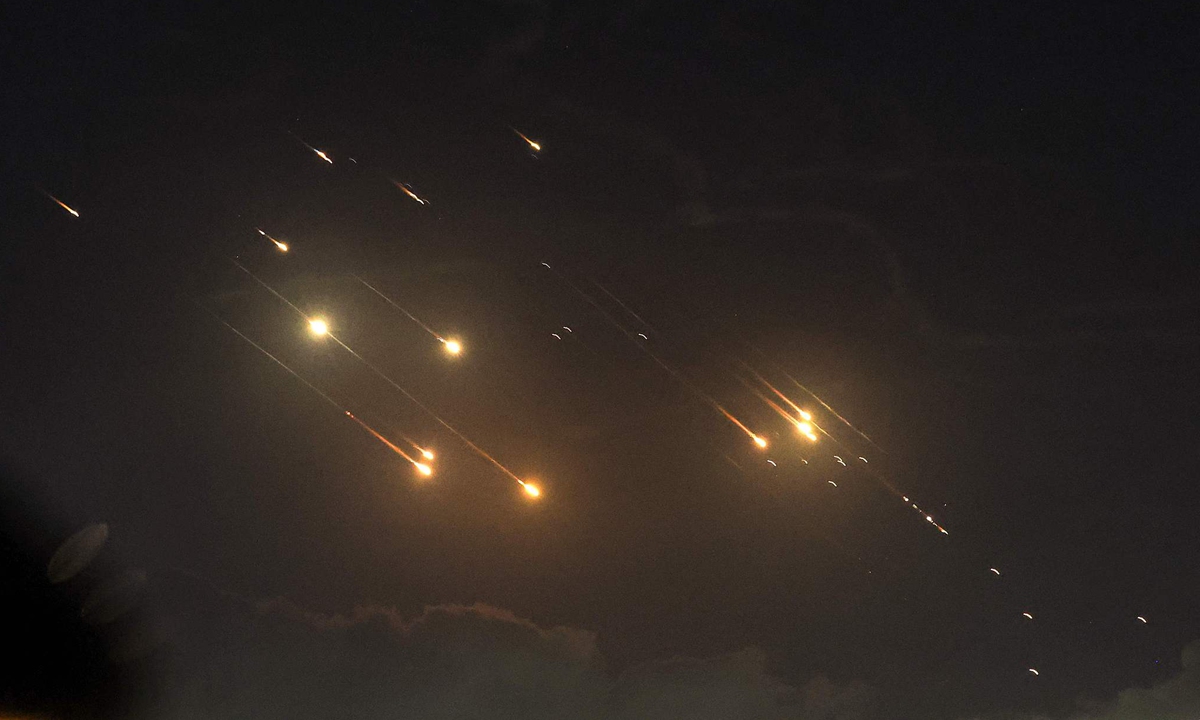Experts warn of 'inevitable' outbreak of regional multi-point conflicts after Iran fires ballistic missiles at Israel

Photo: CFP
Iran launched nearly 200 ballistic missiles at Israel on Tuesday in what Tehran said was retaliation for the recent killings of top Hezbollah and Hamas officials. Analysts view the attack as the latest escalation of the regional tensions at a time when this round of the Palestinian-Israeli conflict has dragged on for nearly a year, with a greater potential to spill over to regional multi-point conflicts.Iran's Islamic Revolution Guards Corps said in statements on Tuesday that it launched dozens of ballistic missiles on strategic centers in Israel in retaliation for Israel's assassinations of Hamas Politburo Chief Ismail Haniyeh, Hezbollah Secretary-General Sayyed Hassan Nasrallah, and senior IRGC commander Abbas Nilforoushan, as well as its intensification of "malicious acts" with the US support in its offensives against Lebanese and Palestinian peoples, Xinhua reported.
Iran's forces used hypersonic Fattah missiles for the first time, and 90 percent of its missiles successfully hit their targets in Israel, the Revolutionary Guards said, according to Reuters.
The Israel Defense Forces said it conducted a "large number of interceptions." Israeli Prime Minister Benjamin Netanyahu told Israelis that Iran "made a big mistake" and "will pay" for launching a missile attack on the country Tuesday, according to CNN.
Iranian Foreign Minister Abbas Araqchi posted on social media platform X early on Wednesday that Iran exercised "self-defense" against Israel and its action is concluded unless the "Israeli regime decides to invite further retaliation," Reuters reported. "Our action is concluded unless Israeli regime decides to invite further retaliation. In that scenario, our response will be stronger and more powerful," Araqchi added.
Jordan, Iraq, and Lebanon have announced the closure of their airspace on Tuesday evening after the Iranian missile attack.
Meanwhile, 55 people were killed and 156 were injured in Israeli airstrikes on Lebanon in the past 24 hours, according to the Lebanese health ministry on early Wednesday.
With war ramping up across the Middle East on Tuesday, UN Secretary-General Antonio Guterres appealed for the violence to end now. "I condemn the broadening of the Middle East conflict, with escalation after escalation," he said in a tersely worded statement. "This must stop. We absolutely need a ceasefire."
Iran's move is a response to a series of recent developments in the region, experts said. "Recently, evaluations from both Iran and the international community suggest that Iran is in a rather unfavorable situation," Liu Zhongmin, a professor at the Middle East Studies Institute of Shanghai International Studies University, told the Global Times on Wednesday.
Iran has endured pressure for a long time, and this move may intend to reverse the increasingly disadvantageous situation for Iran over the past few months, Liu said.
According to the Washington Post, US Vice President Kamala Harris said Tuesday she condemned Iran's attack on Israel "unequivocally" and "fully support[s]" President Joe Biden's order for the US military to shoot down Iranian missiles aimed at Israel.
Experts warned that the regional situation is at high risk of escalating into multi-point conflicts. The US continues to indulge Israel and tacitly allows it to take any unrestricted military action, Sun Degang, director of the Center for Middle Eastern Studies at Fudan University, told the Global Times on Wednesday.
"The US has sent the wrong signals to the wrong allies at the wrong time, leading to an escalation of the situation that is out of control and spreading. Therefore, it is likely that multi-point conflicts will inevitably erupt next," Sun said.
Experts also noted that the difficulty faced by the US to maintain its balancing policy in the Middle East will increase.
The US aims to maintain comprehensive support for Israel while hoping to avoid being drawn into a new round of conflict, which could affect its strategic contraction in the Middle East and the global shift of focus toward great power competition, Liu said.
Therefore, the US has adopted a strategy of dynamic military adjustments. Whenever the crisis escalates, it enhances its military presence in the Middle East to demonstrate support for Israel and deter the Iran-led axis of resistance, Liu noted. "However, as tensions between Israel and Iran escalate, achieving this balance will be increasingly challenging."
According to the Department of Consular Affairs of China's Ministry of Foreign Affairs, 146 Chinese citizens in Lebanon and five foreign family members safely arrived in Beijing on Wednesday on a charter flight operated by Air China, following 69 Chinese citizens in Lebanon, along with their 11 foreign family members, on Tuesday safely arrived in Cyprus aboard the vessel Xin Xia Men of China Ocean Shipping Group.
All Chinese citizens who wished to evacuate have now safely left Lebanon. The Chinese embassy in Lebanon will continue its work and remain on duty, the department said on Wednesday.
